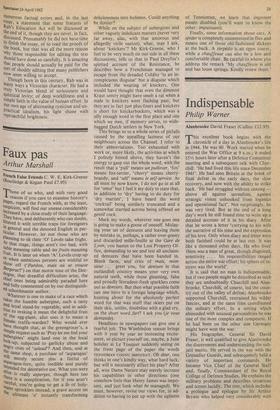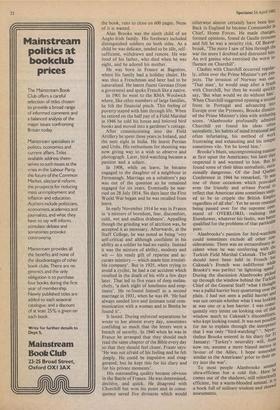Indispensable
Philip Warner
Alanbrooke David Fraser (Collins £12.95) This excellent book begins with the chronicle of a day in Alanbrooke's life in 1944. He was 60. Work started when he entered the War Office at 9 a.m.; it ended 151/2 hours later after a Defence Committee meeting and a subsequent talk with Chur- chill. 'He had lived this life since December 1941'. He had seen Britain at the brink of final defeat in the early days, the slow recovery, and now with the ability to strike back. 'He had struggled without ceasing above all against unrealism, against strategic vision unhooked from logistics and operational fact'. Not surprisingly, he was very tired. But at the end of a long day's work he still found time to write up a detailed account of it in his diary. After that he wrote a letter 'carrying to his wife the narrative of his time and the expression of his love. Only when diary and letter were both finished could he at last rest. It was like a thousand other days. He who lived them was a man of great, though disguised, sensitivity .... his responsibilities ranged across the entire war effort; his sphere of in- terest was the world'.
It is said that no man is indispensable, but if two people might be described as such they are undoubtedly Churchill and Alan- brooke. Churchill, of course, led the coun- try out of the valley of defeat; Alanbrooke supported Churchill, restrained his wilder fancies, and at the same time coordinated the military effort. In a setting which abounded with unusual personalities he was one of the most complex and competent. If he had been on the other side Germany might have won the war.
His biographer, General Sir David Fraser, is well qualified to give Alanbrooke the discernment and understanding the sub- ject merits. He served in the war with the Grenadier Guards, and subsequently held a variety of important commands. He became Vice Chief of the General Staff and, finally, Commandant of the Royal College of Defence Studies. He explains the military problems and describes situations and scenes lucidly. The text, which includes a prologue and epilogue by Sir Arthur Bryant who helped very considerably with the book, runs to close on 600 pages. None of it is wasted.
Alan Brooke was the ninth child of an Anglo-Irish family. His forebears included distinguished soldiers on both sides. As a child he was delicate, tended to be idle, self- sufficient, withdrawn and remote. He was fond of his father, who died when he was eight, and he adored his mother.
He was born in France at Bagneres, where his family had a holiday chalet. He was thus a Frenchman and later had to be naturalised. He learnt fluent German (from a governess) and spoke French like a native.
In 1901 he went to the RMA Woolwich where, like other members of large families, he felt the financial pinch. This feeling of poverty stayed with him through life. When he retired on the half pay of a Field Marshal in 1946 he sold his house and beloved bird books and moved into a gardener's cottage.
After commissioning into the Field Artillery he spent three years in Ireland, and the next eight in India. He learnt Persian and Urdu. His enthusiasm for shooting was now giving way to a wish to observe and photograph. Later, bird-watching became a passion and a solace.
In 1908, while on leave, he became engaged to the daughter of a neighbour in Fermanagh. Marriage on a subaltern's pay was out of the question so he remained engaged for six years. Eventually he mar- ried on 28 July 1914. Six days later the First World War began and he was recalled from leave.
In early November 1914 he was in France in 'a mixture of boredom, fear, discomfort, cold, wet and endless drabness'. Appalling though the grinding war of attrition was, he accepted it as necessary. Afterwards, at the Staff College, he was noted as being 'very self-critical and although confident in his ability as a soldier he had no vanity. Instead it was the mixture of ability, modesty and wit — his ready gift of repartee and ac- curate mimicry — which made him irresisti- ble company'. But in 1925, when trying to avoid a cyclist, he had a car accident which resulted in the death of his wife a few days later. That led to five years of deep melan- choly, 'a dark night of loneliness and emp- tiness'. He re-found himself in a second marriage in 1931, when he was 49. 'He had always needed love and intimate total com- munication with a woman and in Benita he found it'.
It lasted. During enforced separations he wrote to her almost every day, sometimes confiding so much that the letters were a breach of security. In 1940 when he was in France he arranged that they should each read the same chapter of the Bible every day so that they should feel closer. Fraser says: `He was not afraid of his feeling and he felt deeply. He could be impulsive and exag- gerated; but he kept this for his diary and for his private moments'.
His outstanding quality became obvious in the Battle of France. He was determined, decisive, and quick. He disagreed with Churchill but won his point and in conse- quence saved five divisions which would
otherwise almost certainly have been lost. Back in England he became Commander in Chief, Home Forces. He made changes, formed opinions, found de Gaulle tiresome and felt he was a security risk. Of Beaver- brook, `The more I saw of him through the war the more I doubted and distrusted hint. An evil genius who exercised the worst in- fluence on Churchill'.
Clashes with Churchill occurred regular' ly, often over the Prime Minister's pet pro- jects. The invasion of Norway was one. `That man', he would snap after a brush with Churchill, but then he would quicklY say, 'But what would we do without hill'''. When Churchill suggested opening a second front in Portugal and advancing into Europe over the Pyrenees, Brooke dismiss' ed the Prime Minister's idea with witherinS scorn. `Alanbrooke profoundly admired Churchill yet found his ideas often unrealistic, his habits of mind irrational and often infuriating, his method of work frustrating and exhausting and his temper sometimes vile. Yet he loved him.'
Brooke's blunt, uncompromising manner at first upset the Americans; but later theY respected it and warmed to him. But he found some of their ideas unrealistic, occa- sionally dangerous. Of the 2nd Quebec Conference in 1944 he remarked, 'It was, one of those occasions which provoked even the friendly and urbane Portal to reflect that American aims sometimes seetn- ed to be to cripple the British EmPire, regardless of all else'. Yet he never resented being passed over for the supreme cool' mand of OVERLORD, realising that, Eisenhower, whatever his faults, was beet qualified for the problems of that particular post. Alanbrooke's passion for bird-watching could sometimes exclude all other con- siderations. There was an extraordinary cident when he was conferring with the Turkish Field Marshal Cakmak. The talks should have been held in French but Cakmak's French was indifferent while Brooke's was perfect 'at lightning sPeett',; During the discussion Alanbrooke pick
e°
up through the window behind the Turkish Chief of the General Staff 'what I thought was a pallid harrier busy quartering overt hAe plain. I had not seen a pallid harrier an was not certain whether what I was looking at was one or a hen harrier. I was copse; quently very intent on looking out of tha window much to Cakmak's discomfiture, who kept looking round. It was not possible for me to explain through the interpreter that I was only "bird-watching" '. Never, theless Brooke entered in his diary for 31 January: 'Turkey's neutrality will, fr°1/1 now on, assume a more biased nature in favour of the Allies, I hope somewhat similar to the Americans' prior to their en- try into the war'. To most people Alanbrooke seemed ultra-efficient but a cold fish. Here he comes out of the shadows, still relentlessly efficient, but a warm-blooded animal. It Is, a book full of military wisdom and shrewd assessments.







































 Previous page
Previous page